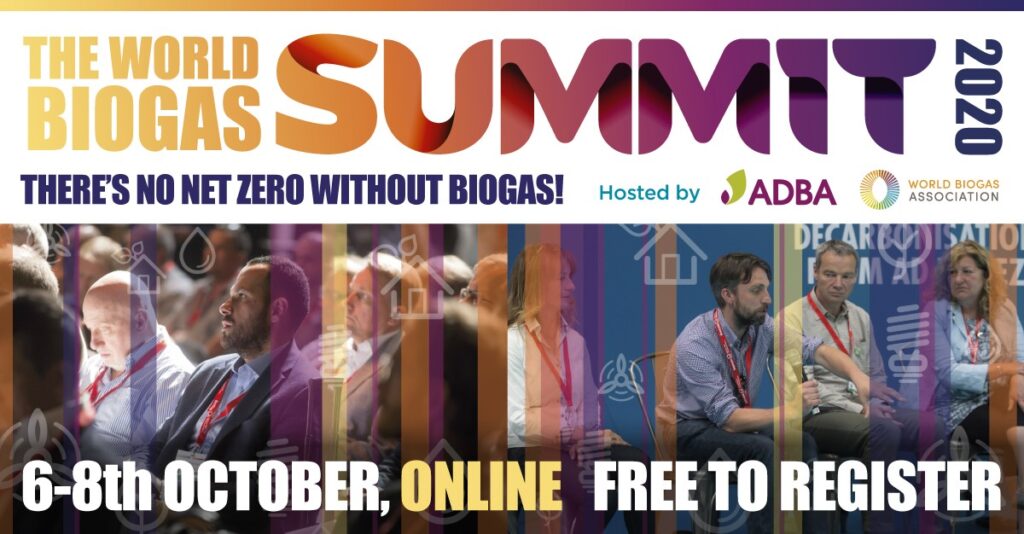Free-to-attend panel at The World Biogas Summit 2020 6 October, 3.30pm (BST): 𝘾𝙖𝙧𝙗𝙤𝙣 𝙉𝙚𝙪𝙩𝙧𝙖𝙡𝙞𝙩𝙮 – 𝙩𝙝𝙚 𝘾𝙡𝙞𝙢𝙖𝙩𝙚 𝘽𝙚𝙣𝙚𝙛𝙞𝙩𝙨 𝙤𝙛 𝘽𝙞𝙤𝙜𝙖𝙨
Co-hosted by representatives of the World Biogas Association (WBA) and the Global Methane Initiative (GMI), the joint panel will introduce several projects that demonstrate successful documentation of climate benefits through lifecycle analysis and efforts by “Biogas Done Right™” to incorporate these measures into replicable best practices.
WBA will moderate and lead an interactive discussion about how survey and econometric modelling can be used to document existing and potential biogas generation.
Speakers include:
Moderator: Matt Hamilton, GMI Biogas Subcommittee Co-Chair
Rebecca Thompson, Senior Policy Manager, WBA, author: Review of Pathways 2030
World Biogas Association –Speakers
Thomas Minter, CEO, Malaby Biogas – Lifecycle Analysis of a Plant Managing Carbon
Rebecca Boudreaux, Ph.D., President, Oberon Fuels
Global Methane Initiative – Speakers
Bruce Dale, Michigan State University – “Biogas Done Right™”
Stefano Di Lazzaro, Italian Biogas Consortium (CIB)- ”Biogas Done Right™”
Lord Deben, Chairman, Committee on Climate Change (CCC)
Under Lord Deben’s leadership, the CCC has set out an ambitious climate agenda to hold the UK government to account on its Net Zero commitment. Here he will assess how the UK is performing against its targets and what more needs to be done.
Panel: Financing a sustainable future with biogas at its heart
The transition to clean, sustainable, low carbon economies will inevitably require vast financing, through a combination of the private and public sectors. The IEA calculates $13.5 trillion will be needed in the global energy sector. Where will this come from? What pricing mechanisms will ensure that the biogas industry gets rewarded for all the value it delivers so that the economics stack up? How can the biogas sector attract the level of finance it needs and deserves?
This panel will consider various aspects of financing the Green Recovery, look at examples of sustainability funding and consider how biogas should be integrated into the overall approach.
11:00-13:00 (BST)
Panel: How to achieve the Net Zero Reality – AD in the city
Most of the world’s population now lives in cities, so sustainable urban living is vital to achieving Net Zero emissions. Circular cities, utilising AD to process waste streams, provide biogas for local heat, power and fuel needs, and recycle nutrients to urban farming and community gardens, are an increasing reality and an exciting prospect to be rolled out across the globe.
Urban developments with a focus on sustainability and efficient heat use, combined with low carbon transport networks, especially public transport systems, are vital to achieving Net Zero. This panel will look at cities around the world that are leading their nations in achieving their Paris climate change commitments.
14:15-15:45 (BST)
Panel: Saving the world’s soils – digestate and soil health
Soils are an endangered ecosystem globally and it is an urgent priority that action is taken to reduce erosion and improve the organic matter content of soils. Biogas production has a clear role to play, not just for its recognised role as a producer of natural fertiliser (digestate) but for the sustainable farming practices it encourages. This panel considers the whole systems role of biogas in restoring the world’s soils.
Register for Free
Source LinkedIn

